Federal Courts/Jurisdiction
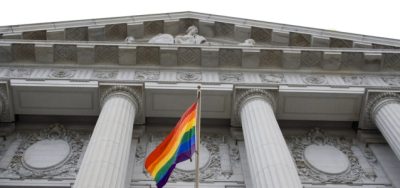
Supreme Court’s DOMA Decision Good for Economic Competitiveness
In the global economy of the twenty-first century, a globally mobile workforce is critical to remaining competitive. Yet for LGBT employees, their families, and their employers, significant barriers remain in place. The Supreme Court’s June 26 decision in United States v. Windsor finding part of the Defense of Marriage Act (DOMA) unconstitutional has clear and direct benefits for married same-sex couples, including bi-national couples. But beyond the benefits to married couples themselves, the Court’s decision is also a win for economic competitiveness. Specifically, the DOMA ruling makes U.S. businesses more globally competitive because they now can attract and retain foreign-born employees who want to stay in the United States with their same-sex spouses. Read More
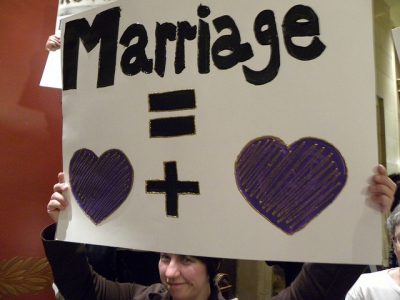
Supreme Court Strikes Down DOMA, Affirms Immigration Rights of Gay and Lesbian Couples
Today, the Supreme Court issued its decision in the case United States v. Windsor, striking down section 3 of the Defense of Marriage Act, or DOMA, on the basis that it violated equal protection under the due process clause of the 5th Amendment. DOMA established an exclusively heterosexual definition of “marriage,” and denied same-sex couples any federal benefits, including immigration benefits. This is a historic day for gay and lesbian marriage rights, as DOMA disqualified same-sex couples from over a thousand federal benefits, and made same-sex couples in committed relationships second-class citizens in the eyes of the federal government. Read More

House Immigration Bill Promotes Old Model Immigration Solutions
Today the House held a hearing on H.R. 2278, the "Strengthen and Fortify Enforcement Act" (the SAFE Act), which is designed, as its name suggests, to be a lopsided, enforcement-only bill that imposes additional criminal penalties, border security, and detention and deportation, while encouraging discredited policies such as self-deportation and state interference with immigration law. Instead of these old enforcement-only policies, which do not work, what is needed is a comprehensive solution that fixes our broken legal immigration system and provides a path to earned legalization. Read More

Lawsuit Seeks to Learn How Government Responds to Complaints of Misconduct by Immigration Judges
Washington, DC – The public has a right to know whether the government adequately investigates and resolves complaints alleging misconduct by immigration judges, the American Immigration Lawyers Association (AILA) said in a lawsuit filed today in federal district court in Washington, D.C. The lawsuit, filed under the Freedom of Information… Read More

Moncrieffe v. Holder: Implications for Drug Charges and Other Categorical Approach Issues
Washington, D.C.—Last week, the Supreme Court issued a decision in Moncrieffe v. Holder, holding that a state drug conviction is not an aggravated felony when the statute of conviction extends to the social sharing of a small amount of marijuana. The case has important implications not only… Read More

Eleventh Circuit Holds that Filing Limitations on Motions to Reopen Are Subject to Equitable Tolling
For Immediate Release Washington, D.C. – Over the last two weeks, the Eleventh Circuit issued two decisions holding that the time and numerical limitations on motions to reopen are subject to equitable tolling. Noncitizens ordered removed in the Eleventh Circuit now may seek, under certain circumstances, to reopen… Read More
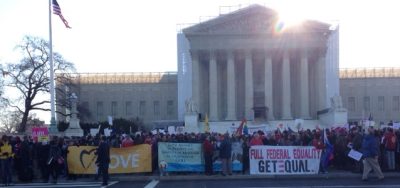
Immigration Reform is an LGBT Issue
By Victoria Neilson, Legal Director, Immigration Equality. This week the U.S. Supreme Court is hearing oral arguments in two cases, Hollingsworth v. Perry and United States v. Windsor, that will forever change the course of the struggle for lesbian, gay, bisexual, and transgender (LGBT) equality. While we are hopeful that the Court will strike down the Defense of Marriage Act (DOMA) thereby clearing the way for the federal government, including U.S. Citizenship and Immigration Services and the Department of State, to honor our marriages, no one can predict with any certainty what the Court will do. Read More
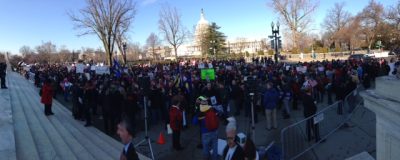
How the Supreme Court Decision on DOMA Will Impact Immigration Law
Family unity is one of the driving forces in our immigration system. United States citizens and lawful permanent residents can obtain immigrant visas for their spouses. Many foreign nationals who come to the United States on employment-based visas bring their spouses and children with them. And some waivers and forms of relief from removal are available only to those with close relatives living in the United States. Read More
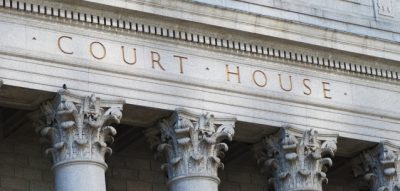
SCOTUS Narrows Protections For Noncitizens Who Received Poor Legal Advice
Almost three years ago, in the landmark decision Padilla v. Kentucky, the Supreme Court acknowledged the severity of deportation and that our current immigration laws make “removal nearly an automatic result” for many noncitizens convicted of crimes. Consequently, the Court held that a criminal defense attorney must advise noncitizen clients about the risks of deportation if they accept a plea bargain. If the defense attorney fails to provide this advice, the noncitizen can seek to have the conviction set aside. Such recourse brings integrity to the criminal justice and immigration systems and ensures that immigrants who reasonably rely on advice from their lawyers are not unfairly held accountable for their lawyers’ mistakes. Read More
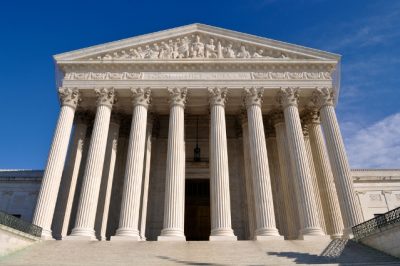
Out of Legal Options, Alabama Files Petition at Supreme Court
Nearly five months ago, a federal appeals court in Atlanta issued a set of opinions that invalidated numerous provisions of Alabama HB 56, the most pernicious state immigration law in the country. After Alabama asked the full court to reconsider its rulings, the active judges unanimously rejected its request. Out of other legal options, the state filed a petition with the Supreme Court on Wednesday seeking to revive some (though not all) of the invalidated provisions. While the odds remain small that the Justices will take up the case, granting the petition could set up another legal showdown similar to the case over Arizona SB 1070. Read More
Make a contribution
Make a direct impact on the lives of immigrants.
